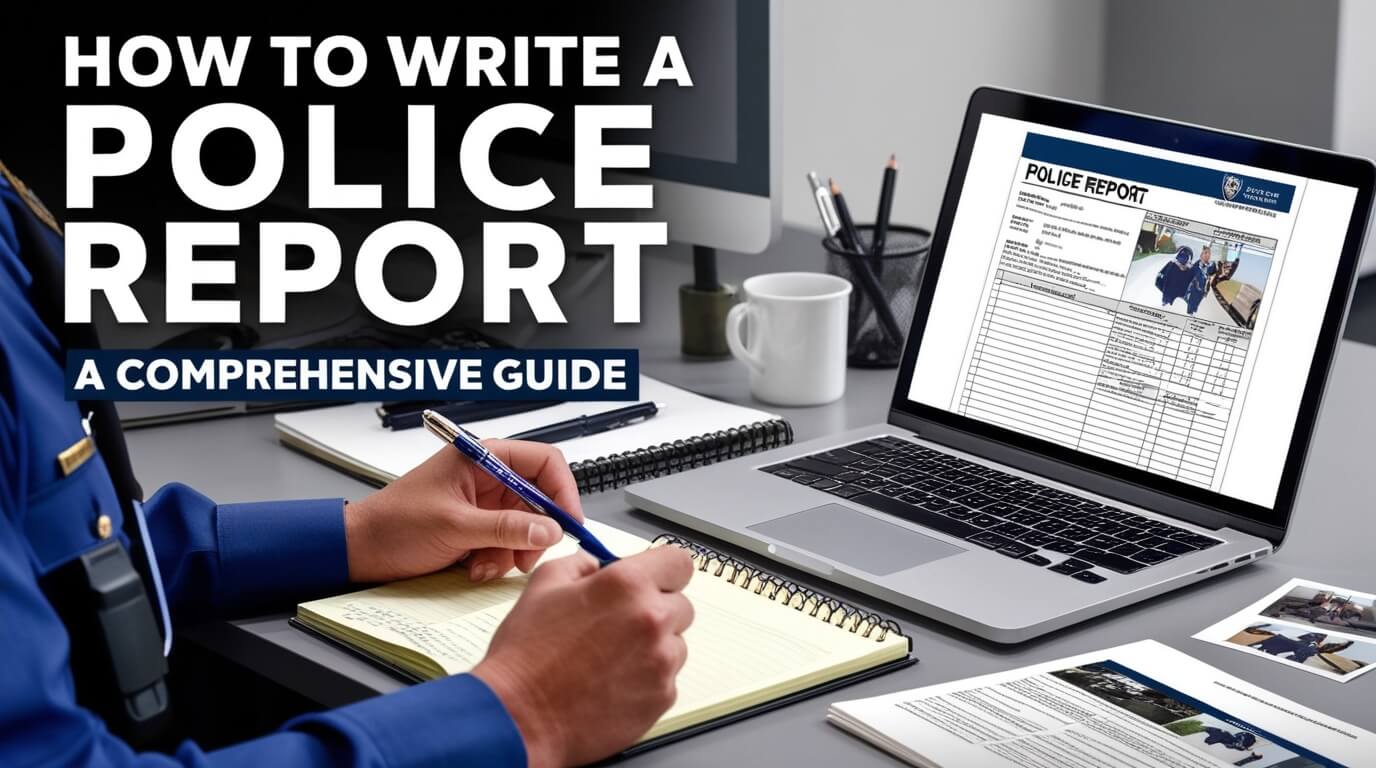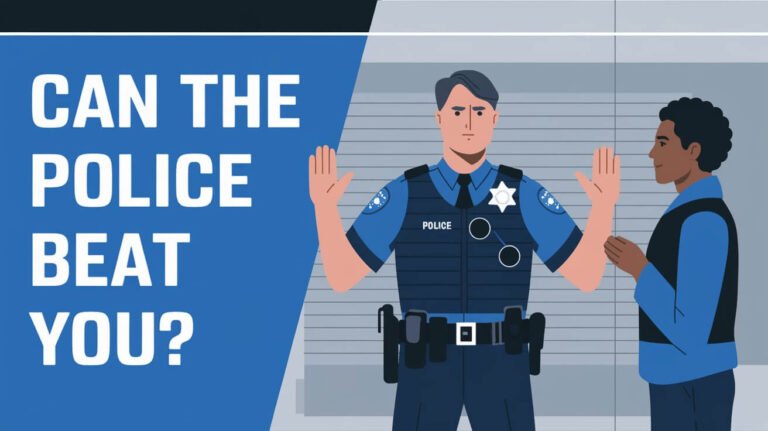How to Write a Police Report: A Comprehensive Guide

Police reports are key documents in law enforcement. They record incidents, crimes, and investigations. These reports help in court cases and future reviews. Writing good police reports is a must-have skill for all officers.
This guide helps you create better police reports. It covers the basics and advanced methods. New and experienced officers can learn useful tips here.
What is a police report?
A police report is an official document that records the details of an incident or crime. It’s a factual account of what happened, when it happened, and who was involved. These reports are used by various parties, including:
- Law enforcement agencies
- Prosecutors
- Defense attorneys
- Insurance companies
- Courts
Police reports form the backbone of investigations and legal proceedings. They’re often the first piece of evidence reviewed in a case.
Types of police reports
There are several types of police reports, each serving a specific purpose:
- Incident reports
- Arrest reports
- Crime reports
- Accident reports
- Supplemental reports
Each type has its own set of requirements and focus areas. Knowing which type to use is the first step in writing an effective report.
Legal significance of police reports
Police reports carry significant legal weight. They can:
- Provide probable cause for arrests
- Support search warrant applications
- Serve as evidence in court
- Aid in crime analysis and prevention strategies
Given their importance, it’s crucial to write these reports accurately and professionally.
Preparing to Write a Police Report
Gathering necessary information
Before you start writing, collect all the relevant information. This includes:
- Date, time, and location of the incident
- Names and contact details of involved parties
- Witness statements
- Physical evidence
- Photographs or sketches of the scene
The more thorough your initial information gathering, the easier it will be to write a comprehensive report.
Understanding your department’s guidelines
Each police department has its own guidelines for report writing. Familiarize yourself with:
- Preferred formats
- Required forms
- Specific language or terminology
- Filing procedures
Following these guidelines ensures consistency across reports and helps avoid administrative issues.
Essential tools for report writing
Having the right tools can make report writing more efficient. Some essentials include:
- A reliable pen
- Notepad for field notes
- Digital camera or smartphone
- Voice recorder (if allowed by department policy)
- Laptop or tablet for digital report writing
Structure of a Police Report
Basic elements of a police report
Every police report should include these fundamental elements:
- Report number
- Date and time of the incident
- Location of the incident
- Officer’s name and badge number
- Names of involved parties
- Narrative of events
- List of evidence collected
- Witness statements
- Actions taken by officers
Formatting guidelines
Proper formatting makes reports easier to read and understand. Follow these guidelines:
- Use clear, legible handwriting if writing manually
- Type reports in a standard font (usually Times New Roman or Arial)
- Use 12-point font size
- Double-space the text for readability
- Use proper margins (usually 1 inch on all sides)
- Number pages if the report is more than one page long
Common sections in a police report
Most police reports are divided into several sections:
- Header: Includes report number, date, time, and officer information
- Incident details: Type of incident, location, involved parties
- Narrative: Detailed account of what happened
- Witness statements: Summaries or direct quotes from witnesses
- Evidence: Description of physical evidence collected
- Officer actions: Steps taken during and after the incident
- Conclusion: Summary of findings or next steps
Step-by-Step Guide to Writing a Police Report
Documenting incident details
Start with the basics:
- Write down the date, time, and exact location of the incident
- Note the weather conditions if relevant
- Record the names and contact information of all involved parties
- Include identifying details like age, gender, and physical descriptions
Be as specific as possible. Instead of “around noon,” write “12:05 PM.”
Recording witness statements
When taking witness statements:
- Get the witness’s full name and contact information
- Ask open-ended questions to get a complete account
- Record the statement as close to verbatim as possible
- Note any inconsistencies or changes in the witness’s story
- Have the witness review and sign their statement if possible
Describing evidence
When describing evidence:
- Be specific about what the evidence is
- Note where it was found
- Describe its condition
- Explain how it was collected and stored
- Include any identifying numbers or markings
For example, instead of “a knife,” write “a 6-inch kitchen knife with a black handle, found on the living room floor 3 feet from the victim.”
Narrating the sequence of events
When writing the narrative:
- Use chronological order
- Start with your arrival at the scene
- Describe what you observed
- Include what others told you, clearly attributing statements
- Detail the actions you took
- End with the resolution or your departure from the scene
Concluding the report
In the conclusion:
- Summarize the key points of the incident
- Note any charges filed or citations issued
- Indicate if further investigation is needed
- Mention any follow-up actions planned
Language and Style in Police Report Writing
Using clear and concise language
Clarity is key in police reports. To achieve this:
- Use short, simple sentences
- Stick to facts, avoiding opinions or assumptions
- Be specific and precise in your descriptions
- Use active voice whenever possible
For example, instead of “The suspect was observed fleeing the scene,” write “I saw the suspect run from the store.”
Avoiding jargon and bias
While some technical terms are necessary, avoid excessive jargon. Also:
- Explain any technical terms you must use
- Avoid slang or colloquialisms
- Use neutral language to describe people and events
- Be aware of and avoid personal biases in your writing
Maintaining objectivity
Objectivity is crucial in police reports. To maintain it:
- Stick to observable facts
- Avoid making assumptions or drawing conclusions
- Use quotation marks for direct quotes
- Clearly differentiate between what you observed and what others told you
Common Mistakes to Avoid in Police Report Writing
Omitting crucial information
Don’t forget to include:
- All parties involved, including officers
- Complete descriptions of suspects
- Details of any injuries or property damage
- Actions taken by officers, including use of force if applicable
Using unclear or ambiguous language
Avoid vague terms like “appeared to be” or “seemed like.” Be specific about what you observed.
Inconsistencies in the narrative
Make sure your timeline of events is consistent and logical. Double-check dates, times, and sequences of events for accuracy.
Tips for Improving Your Police Report Writing Skills
Practice and repetition
Like any skill, report writing improves with practice. Take every opportunity to write reports, even for minor incidents.
Seeking feedback from supervisors
Ask your supervisors to review your reports and provide constructive criticism. Learn from their experience and expertise.
Continuous learning and adaptation
Stay updated on:
- Changes in department policies
- New legal requirements
- Advances in report writing technology
Attend training sessions and workshops when available to refine your skills.
Technology and Police Report Writing
Digital report writing systems
Many departments now use digital systems for report writing. These can:
- Streamline the report writing process
- Improve accuracy through built-in checks
- Make reports easier to search and analyze
- Facilitate information sharing between agencies
Benefits and challenges of electronic reporting
Benefits include:
- Faster report completion
- Improved legibility
- Easier data analysis
Challenges might include:
- Learning new software
- Technical glitches
- Potential for data breaches
Legal Considerations in Police Report Writing
Ensuring admissibility in court
To ensure your report is admissible in court:
- Stick to facts you personally observed
- Clearly attribute information from other sources
- Avoid including your opinions or conclusions
- Be thorough and accurate in your descriptions
Protecting sensitive information
Be aware of information that should be protected, such as:
- Juvenile offender identities
- Victim information in sensitive cases
- Confidential informant details
- Ongoing investigation specifics
liability issues
Remember that your report could be used in court. Inaccuracies or omissions could lead to:
- Dismissed cases
- Successful appeals
- Civil liability for you or your department
Always write as if your report will be scrutinized in court.
The Impact of Well-Written Police Reports
On investigations and prosecutions
Well-written police reports can:
- Provide a solid foundation for investigations
- Help prosecutors build strong cases
- Lead to successful convictions
- Save time and resources in the legal process
On community trust and transparency
Clear, accurate reports contribute to:
- Increased public trust in law enforcement
- Greater transparency in police operations
- Improved community relations
- Better accountability for police actions
Conclusion
Writing effective police reports is a critical skill for law enforcement professionals. It requires attention to detail, clear communication, and a commitment to accuracy and objectivity. By following the guidelines in this comprehensive guide, you can improve your report writing skills and contribute to more effective law enforcement and justice administration.
Remember, a well-written police report does more than document an incident. It serves as a crucial tool in the pursuit of justice, helps maintain public safety, and contributes to the overall effectiveness of the criminal justice system. Continual practice and improvement in this area will make you a more valuable member of your department and a more effective guardian of public safety.






